|
Books Should Be Free Loyal Books Free Public Domain Audiobooks & eBook Downloads |
|
|
Books Should Be Free Loyal Books Free Public Domain Audiobooks & eBook Downloads |
|
Fiction |
|---|
|
Book type:
Sort by:
View by:
|
By: Joseph Conrad (1857-1924) | |
|---|---|
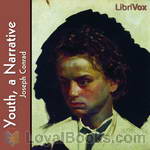 Youth, a Narrative
Youth, a Narrative
An autobiographical short story written in 1898 and included as the first story in the 1902 volume Youth, a Narrative, and Two Other Stories. This volume also includes Heart of Darkness and The End of the Tether, which are concerned with maturity and old age, respectively. “Youth” is narrated by Charles Marlow who is also the narrator of Heart of Darkness, Lord Jim and Chance. Youth depicts his first journey to the East.” | |
 Amy Foster
Amy Foster
Classic shortish story by Conrad that relates his self-thought alienation from British society, as a young foreign man survives a shipwreck off the coast of Kent, England only to be shunned by most of the townsfolk. The one exception is the loving, if dull-witted, Miss Foster. | |
 The Point of Honor
The Point of Honor
Set during the Napoleonic Wars, “The Point of Honor” (English title: “The Duel”) features two French Hussar officers, D’Hubert and Feraud. Their quarrel over an initially minor incident turns into a bitter, long-drawn out struggle over the following fifteen years, interwoven with the larger conflict that provides its backdrop. At the beginning, Feraud is the one who jealously guards his honor and repeatedly demands satisfaction anew when a duelling encounter ends inconclusively; he aggressively pursues every opportunity to locate and duel his foe... | |
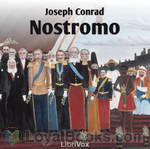 Nostromo
Nostromo
Señor Gould is a native Costaguanan of English descent who owns the silver-mining concession in Sulaco. He is tired of the political instability in Costaguana and its concomitant corruption, and puts his weight behind the Ribierist project, which he believes will finally bring stability to the country after years of misrule and tyranny by self-serving dictators. Instead, the silver mine and the wealth it has generated become a magnet for local warlords to fight over, plunging Costaguana into a new round of chaos... | |
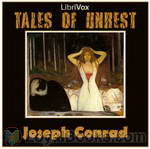 Tales of Unrest
Tales of Unrest
Tales of Unrest (1898) is the first collection of short stories by Joseph Conrad published in his lifetime.Joseph Conrad (1857–1924), a Polish-born English novelist, was a master in the formats of long short story and novella, a form of story longer than conventional short story but shorter than a novel. Some of Conrad's most acclaimed works have been written in these formats, most notably Heart of Darkness (1899).Tales of Unrest contains five stories; Karain: A Memory (written 1897; read by Jhiu), The Idiots (1896; read by Ann Boulais), An Outpost of Progress (1896; read by Kristine Bekere), The Return (1897; read by Raerity) and The Lagoon (1896; read by David Lazarus)... | |
 The Secret Sharer
The Secret Sharer
A young untested ship captain finds a man named Leggatt clinging to the side of his ship. The Captain makes the unusual decision to hide Leggatt in his quarters. What is he thinking? Conrad will tell us. - The Secret Sharer was first published in the August and September 1910 issues of Harper’s Magazine | |
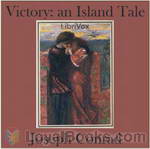 Victory: An Island Tale
Victory: An Island Tale
Recollections of the life of Axel Heyst, one-time manager of the liquidated Tropical Belt Coal Company in a fictitious island in the Pacific. After retreating from society in response to his professional failures, the misanthrope is drawn back by a romantic affair. (Introduction by S. Kovalchik) | |
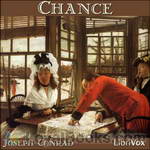 Chance
Chance
Apparently a two part story about a Damsel and a Knight, perhaps a damsel who depends upon the kindness of strangers. It was originally entitled "Dynamite" and first published by installments in the New York Herald. The book itself was the biggest commercial success for Conrad up until that time, 1913. It allowed Conrad for the first time to settle his financial affairs. The author's disdain for people who live on the land is apparent. A new understanding of the word "enthusiastic" is promulgated. And it is a love story. Let us see how the tale goes. | |
 An Outcast Of The Islands
An Outcast Of The Islands
An Outcast of the Islands is the second novel by Joseph Conrad, published in 1896, inspired by Conrad's experience as mate of a steamer, the Vigar. The novel details the undoing of Peter Willems, a disreputable, immoral man who, on the run from a scandal in Makassar, finds refuge in a hidden native village, only to betray his benefactors over lust for the tribal chief's daughter. The story features Conrad's recurring character Tom Lingard, who also appears in Almayer's Folly (1895) and The Rescue (1920), in addition to sharing other characters with those novels... | |
 Under Western Eyes
Under Western Eyes
Under Western Eyes (1911) is a novel by Joseph Conrad. The novel takes place in St. Petersburg, Russia, and Geneva, Switzerland, and is viewed as Conrad's response to the themes explored in Crime and Punishment, Conrad being reputed to have detested Dostoevsky. It is also, some say, Conrad's response to his own early life; his father was a famous revolutionary imprisoned by the Russians, but, instead of following in his father's footsteps, at the age of sixteen Conrad left his native land forever... | |
 Shadow-Line
Shadow-Line
Dedicated to the author's son who was wounded in World War 1, The Shadow-Line is a short novel based at sea by Joseph Conrad; it is one of his later works, being written from February to December 1915. It was first published in 1916 as a serial and in book form in 1917. The novella depicts the development of a young man upon taking a captaincy in the Orient, with the shadow line of the title representing the threshold of this development. The novella is notable for its dual narrative structure. The full, subtitled title of the novel is The Shadow-Line, A Confession, which immediately alerts the reader to the retrospective nature of the novella... | |
 Almayer's Folly
Almayer's Folly
A European businessman and his Malayan wife have a daughter, Nina. A Malayan prince comes to do trade with the businessman and falls in love with the daughter. Conflict arises when other influences cause distrust in the business partnership and the daughter runs off to be with the prince. | |
 To-morrow
To-morrow
| |
By: Harriet Beecher Stowe (1811-1896) | |
|---|---|
 Uncle Tom's Cabin, Young Folks' Edition
Uncle Tom's Cabin, Young Folks' Edition
| |
 Betty's Bright Idea; Deacon Pitkin's Farm; and the First Christmas of New England
Betty's Bright Idea; Deacon Pitkin's Farm; and the First Christmas of New England
| |
 Oldtown Fireside Stories
Oldtown Fireside Stories
A sequel to Oldtown Folks, featuring some of the same characters, these are 15 charming short stories told by ole' Sam Lawson to entertain Horace and Bill, two impressionable, curious and clever young boys of Oldtown (a fictional 1850's New England village), during evenings gathered around the hearth, or roaming with Sam around the countryside. Stowe faithfully and masterfully captures many of the colloquial expressions, superstitions, beliefs, customs and habits of the period that have almost completely faded from modern American culture, as well as conveying many truths about the human condition that haven't changed a bit. ~ | |
By: Jacob Abbott | |
|---|---|
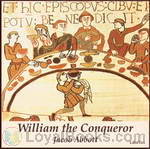 William the Conqueror
William the Conqueror
There are certain names which are familiar, as names, to all mankind; and every person who seeks for any degree of mental cultivation, feels desirous of informing himself of the leading outlines of their history, that he may know, in brief, what it was in their characters or their doings which has given them so widely-extended a fame. Consequently, great historical names alone are selected; and it has been the writer’s aim to present the prominent and leading traits in their characters, and all the important events in their lives, in a bold and free manner, and yet in the plain and simple language which is so obviously required in works which aim at permanent and practical usefulness... | |
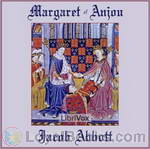 Margaret of Anjou
Margaret of Anjou
Margaret of Anjou, wife of England’s Henry VI, played a key role in launching the storied War of the Roses – the 30-year civil conflict fuelled by the Lancasters and the Yorks, each vying for the British throne in the 15th century. (Summary by Cathy Barratt.) | |
 Georgie
Georgie
| |
 Caleb in the Country
Caleb in the Country
| |
 Rollo at Work
Rollo at Work
| |
 Forests of Maine Marco Paul's Adventures in Pursuit of Knowledge
Forests of Maine Marco Paul's Adventures in Pursuit of Knowledge
| |
 Rollo in Paris
Rollo in Paris
| |
 Rollo on the Atlantic
Rollo on the Atlantic
| |
 Rollo on the Rhine
Rollo on the Rhine
| |
 Rollo in Naples
Rollo in Naples
| |
 Rollo in Geneva
Rollo in Geneva
| |
 Rollo in the Woods
Rollo in the Woods
| |
 Rollo in Holland
Rollo in Holland
| |
 Rollo in Switzerland
Rollo in Switzerland
| |
 Rollo in Rome
Rollo in Rome
| |
 Rollo in Scotland
Rollo in Scotland
| |